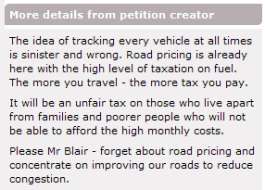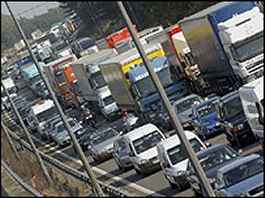Road
pricing & concerns over satellite tracking
| Petition
to scrap the Government's road pricing proposals involving satellite
tracking The petition was created by Peter Roberts which says "'We the undersigned petition the Prime Minister to Scrap the planned vehicle tracking and road pricing policy." Malcolm Bailey spotted this item and recommends you look at the campaign website. http://petitions.pm.gov.uk:80/traveltax/ 
So let's look at a few articles on the matter. Why not express your views on the V8BB? A million motorists embarrass road price ministers This was the lead item on the front page of The Times on Saturday 10th February 2007. (10.2.07) Times article on 10th February 2007 Report calls for road pricing The final say on major transport projects such as a third runway at Heathrow airport will be taken out of ministers' hands under sweeping reforms proposed by a government-commissioned report. Sir Rod Eddington, former chief executive of British Airways, warned in his analysis of Britain's transport needs that the current planning regime engenders "paralysis" and should be replaced by an Independent Planning Commission. The new body would have the final say on airport expansions, major road construction and new rail links, a power that currently resides with ministers at the Department for Transport and the Department for Communities and Local Government. Extract from an article by Dan Milmo, Transport Correspondent, Guardian Unlimited on 1.12.06 http://business.guardian.co.uk/story/0,,1961939,00.html Road tolls plan to cut congestion  Congestion is predicted to rise by 25% by 2015 The government will press ahead with plans to introduce trial road-pricing schemes across England, in an effort to cut congestion. The draft Road Transport Bill gives councils more freedom to bring in their own schemes in busy areas and will look at the scope for a national road toll. It also gives councils a bigger say in improving local bus services. Ministers predict that, if no action is taken, congestion could rise 25% by 2015 - mostly in big towns and cities. They intend to tackle the problem through road tolls, building or widening roads where necessary, and better management of existing roads. Nine areas have been earmarked for road pricing trials by the end of 2009; Norfolk, the East Midlands, part of the Thames Valley including Reading, Cambridgeshire, Durham, Greater Manchester, Shrewsbury and Shropshire, Tyne and Wear, and the West Midlands. Black boxes The draft bill seeks to give councils more power to implement their own trials, while ensuring they fit with surrounding schemes. If the trials are successful, a national scheme could be investigated - with drivers possibly paying £1.34 a mile to drive on the busiest roads at rush hour. Black boxes in cars could work out how far they travel on toll roads. The government is also making £200m available to support innovative local transport schemes. And it intends to reform passenger transport authorities, to give councils more of a say on them and develop a "more coherent" approach to public transport in English cities. Trials for national road pricing In August, a letter leaked to the Sunday Times suggested Transport Secretary Douglas Alexander had planned a bill for widespread tolls. In a letter to Leader of the Commons Jack Straw, dated 20th July, he wrote "We are considering pilots on the trunk road network as an important stage towards national road-pricing." Local authorities currently set charges - such as London's - but in the letter Mr Alexander says he should be able to set simpler |
national
standards to prevent confusion. Motoring organisations gave a guarded
welcome to the plans for simpler, national standards. Paul Watters,
head of roads and transport policy for AA Motoring
Trust, said: "We can't have charging schemes coming along without
a degree of uniformity. "It makes sense to have some sort of
universal system."
But Martyn Williams, a transport campaigner for Friends of the Earth, told the BBC in August: "If the money isn't used to improve public transport and to provide alternatives people will just feel they're being taken for a ride. It's good that the new transport secretary is looking at this but he's going to have to be brave to take it forward, and we do need some brave and some difficult decisions to be made because tackling transport is difficult". Article from BBC website 15.11.06 http://news.bbc.co.uk/1/hi/uk_politics/5249538.stm Pay-as-you-go road charge plan
Drivers could pay up to £1.34 a mile in "pay-as-you go" road charges under new government plans. The transport secretary said the charges, aimed at cutting congestion, would replace road tax and petrol duty. Alistair Darling said change was needed if the UK was to avoid the possibility of "LA-style gridlock" within 20 years. Every vehicle would have a black box to allow a satellite system to track their journey, with prices starting from as little as 2p per mile in rural areas. Mr Darling has outlined his proposals to the BBC - previewing a speech he will give to the Social Market Foundation on Thursday. "The advantage is that you would free up capacity on the roads, you would reduce the congestion that we would otherwise face and you would avoid the gridlock that you see in many American cities today," he said. "This is a prize well worth going for. We've got to ask ourselves: would it work. Could it bring the benefits that I believe it could bring, because it would make a real change to the way we drive in this country." A satellite tracking system would be used to enforce the toll, with prices varying from 2p per mile for driving on a quiet road out of the rush hour to £1.34 for motorways at peak times. 'Big Brother' worries The department of transport says the scheme would be fairer because those who travel greater distances would pay the most. Concerns that the tracking system would lead to the state knowing where people were all the time, would have to be addressed, said Mr Darling. He told BBC Radio 4's Today programme he was not trying to drive motorists out of their cars. "It will mean taking some stick. There are a lot of difficult decisions to be taken," he said. "I honestly think road pricing could provide us with a way of managing our roads, of getting more out of it, which must be good for us as individuals as well as the country as a whole." Shadow transport secretary Alan Duncan said he had concerns about the technology and implications for civil liberties. But he also told Today: "I think it is a vision for the future ... We have more cars in the same amount of space so we do have a problem with congestion." A pilot scheme could be carried out using volunteer drivers in a large British conurbation within five to six years, but a national scheme would be rolled out within 10-15 years. The Environment Agency's Nick Rijke warned that shifting money away from fuel duty would take away the incentive for people to use green vehicles. Price incentives? And AA Motoring Trust director Bert Morris said there were a number of issues which needed to be addressed. "Tourism is car-based in this country. Would we have empty hotels on summer days on the coast if people couldn't afford to drive?" It was also important to ensure that drivers with less money were not penalised, Mr Morris added. But transport policy expert Professor Stephen Glaister, from Imperial College, said: "I'm pretty confident that it will make a big difference . . . people do respond to price incentives." No choice RAC Foundation spokeswoman Sue Nicholson said the plan could help counter a projected 45% growth in congestion problems by 2030. "Providing this tax was substitutional to fuel tax and road tax and provided we had some other guarantees then I think, for a lot of people, this would be a tempting option," she said. Environmental group Friends of the Earth broadly welcomed road charging but warned the transport crisis could only be tackled if money raised was invested in improving alternatives to car travel. But the Disabled Drivers' Association's executive director, Douglas Campbell, urged protection for disabled people against increased costs in motoring. "Many disabled people have no choice other than to use a car as public transport just does not meet their door-to-door transport needs," he said. Article from BBC website 6.6.05 http://news.bbc.co.uk/1/hi/uk/4610755.stm |